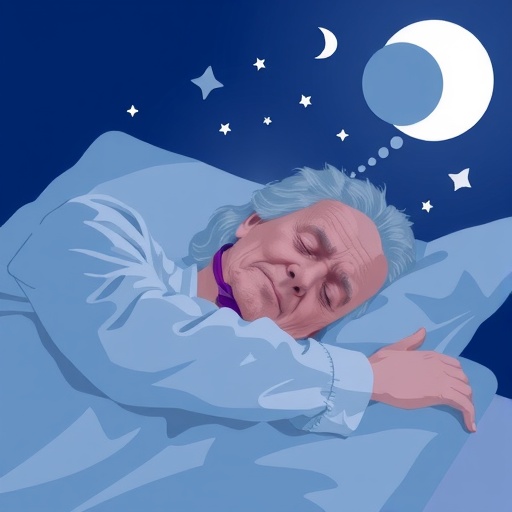In recent years, growing evidence has illuminated the intricate relationship between obstructive sleep apnea (OSA) and cognitive decline. A groundbreaking study published in BMC Psychiatry delves into this complex interplay, investigating how the severity of OSA correlates with mild cognitive impairment (MCI). This research opens promising avenues for understanding how disordered breathing during sleep may contribute to deteriorating cognitive health, marking a significant milestone in sleep medicine and neurology.
Obstructive sleep apnea is a prevalent disorder characterized by recurrent episodes of partial or complete upper airway obstruction during sleep. These events cause intermittent hypoxia and fragmented sleep, which have been hypothesized to impact brain function adversely. Although OSA is widely recognized for its cardiovascular ramifications, its role in cognitive decline has been underappreciated until recently. Emerging studies suggest that the pathophysiological mechanisms triggered by OSA – including oxidative stress, neuroinflammation, and vascular dysfunction – may accelerate neuronal injury, potentially leading to mild cognitive impairment.
The recently conducted cross-sectional study from Jinzhou Medical University’s Sleep Medicine Center analyzed data from 387 patients diagnosed with OSA, aiming to clarify whether sleep apnea severity directly influences the risk of developing MCI. Participants underwent rigorous sleep assessments using overnight polysomnography (PSG) or home sleep apnea tests (HSAT), allowing for detailed measurement of apnea-hypopnea index (AHI) and oxygen desaturation index (ODI). The research team stratified patients into groups based on cognitive function, utilizing the Montreal Cognitive Assessment (MoCA) to define MCI, with scores below 26 indicating cognitive impairment.
One of the study’s most significant findings was the apparent association between severe sleep apnea (AHI ≥ 30 events per hour) and an increased prevalence of MCI. Initially, statistical models indicated that both sleep apnea severity and daytime sleepiness correlated positively with cognitive impairment. However, after adjusting for potential confounders such as age, sex, and comorbid conditions, only severe OSA retained a significant relationship with MCI. This distinction underscores the critical role played by the intensity of sleep-disordered breathing rather than its mere presence.
Daytime sleepiness, often a hallmark symptom of OSA, was assessed using the Epworth Sleepiness Scale (ESS). Participants with ESS scores of 11 or higher, indicative of excessive daytime sleepiness, exhibited a notable association with the risk of MCI. This finding suggests that fragmented and unrefreshing sleep might exacerbate cognitive decline, possibly through mechanisms involving diminished synaptic plasticity and impaired neural repair processes that occur during restful sleep stages.
Quality of nighttime sleep was evaluated using the Pittsburgh Sleep Quality Index (PSQI), with scores of 9 or more reflecting poor sleep quality. The study found that individuals experiencing poor sleep quality were more likely to exhibit mild cognitive impairment. This data emphasizes that factors beyond just AHI and oxygen desaturation – such as the subjective experience of fragmented sleep – are important contributors to the cognitive health of OSA patients.
Importantly, the study controlled for multiple confounding variables, including demographic factors and other health conditions, enabling a more nuanced understanding of the direct effects of sleep apnea severity on cognition. The researchers convincingly argue that severe OSA, accompanied by poor sleep quality and excessive daytime sleepiness, constitutes a triad of risk factors fostering cognitive decline in this population.
The neurobiological pathways linking OSA severity to MCI likely involve chronic intermittent hypoxia and sleep fragmentation, both of which have deleterious effects on brain structure and function. Intermittent hypoxia triggers oxidative stress and neuroinflammation, processes implicated in neurodegenerative diseases such as Alzheimer’s. Concurrently, disrupted sleep impairs memory consolidation and synaptic homeostasis, critical for maintaining cognitive faculties.
This research further reinforces a growing consensus that early diagnosis and targeted management of severe OSA could potentially mitigate the risk or progression of cognitive impairment. Therapeutic interventions like continuous positive airway pressure (CPAP) not only alleviate breathing disruptions but may also preserve cognitive function by reducing intermittent hypoxia and improving sleep continuity.
While this study’s cross-sectional nature limits causal inference, its robust methodology and sample size provide compelling evidence highlighting the importance of assessing cognitive function in patients with OSA, especially those presenting with severe disease and poor sleep quality. Future longitudinal investigations are warranted to trace temporal relationships and evaluate whether treating OSA can reverse or stabilize cognitive decline.
Clinicians are increasingly called upon to screen for cognitive disturbances in OSA patients, particularly given the high prevalence of MCI observed – 38% within this study’s cohort. Incorporating cognitive assessments alongside routine sleep evaluations may facilitate early identification of individuals at risk, enabling timely intervention and possibly altering disease trajectories.
In summary, this meticulous examination underscores that among individuals with obstructive sleep apnea, the severity of the disorder, reduced sleep quality, and daytime somnolence form a constellation of factors that elevate the risk for mild cognitive impairment. By elucidating these relationships, the study not only sheds light on the complex pathophysiology bridging sleep disorders and brain health but also paves the way for integrative approaches to prevent cognitive decline.
As our understanding deepens, the intersection of sleep medicine and neurocognition emerges as a fertile ground for translational research. Harnessing these insights can transform clinical practice, guiding personalized treatment strategies that address not only the respiratory symptoms of OSA but also its cognitive consequences. This paradigm shift holds promise for improving quality of life and cognitive resilience in millions worldwide affected by sleep apnea.
Subject of Research: Relationship between obstructive sleep apnea severity and mild cognitive impairment in affected individuals.
Article Title: Relationship between sleep apnea severity and mild cognitive impairment in people with obstructive sleep apnea
Article References:
Guo, S., Liang, C., Fei, J. et al. Relationship between sleep apnea severity and mild cognitive impairment in people with obstructive sleep apnea. BMC Psychiatry 25, 790 (2025). https://doi.org/10.1186/s12888-025-07244-x
Image Credits: AI Generated




